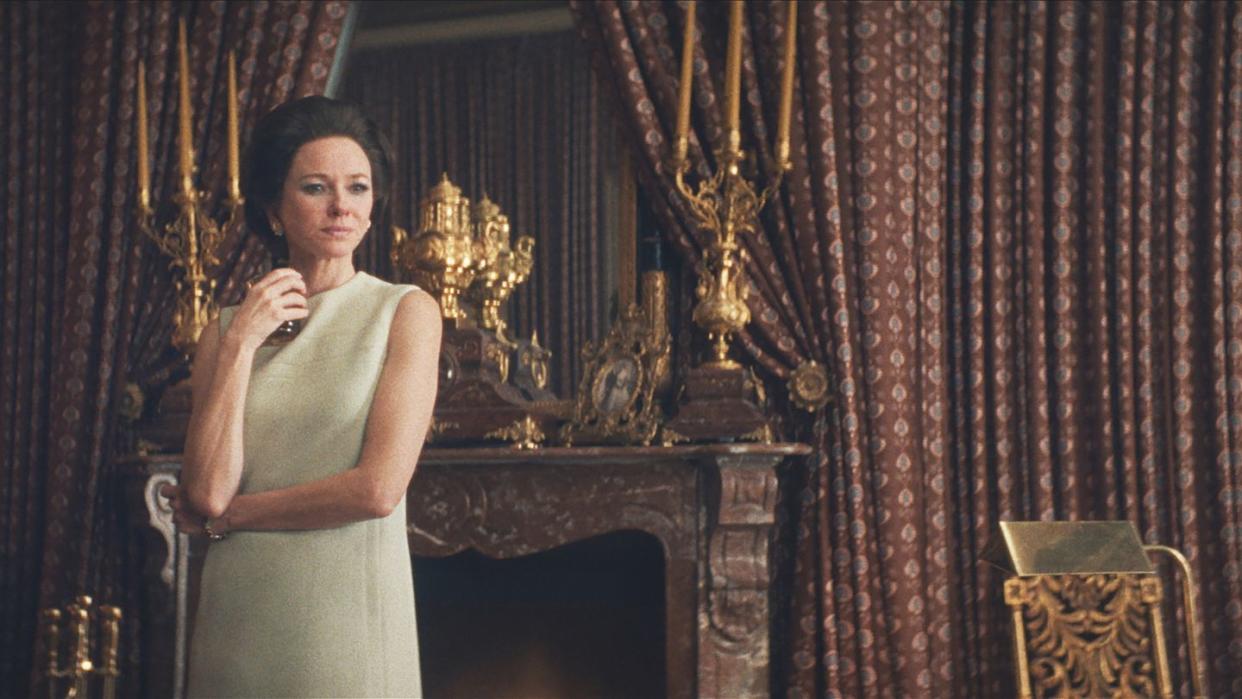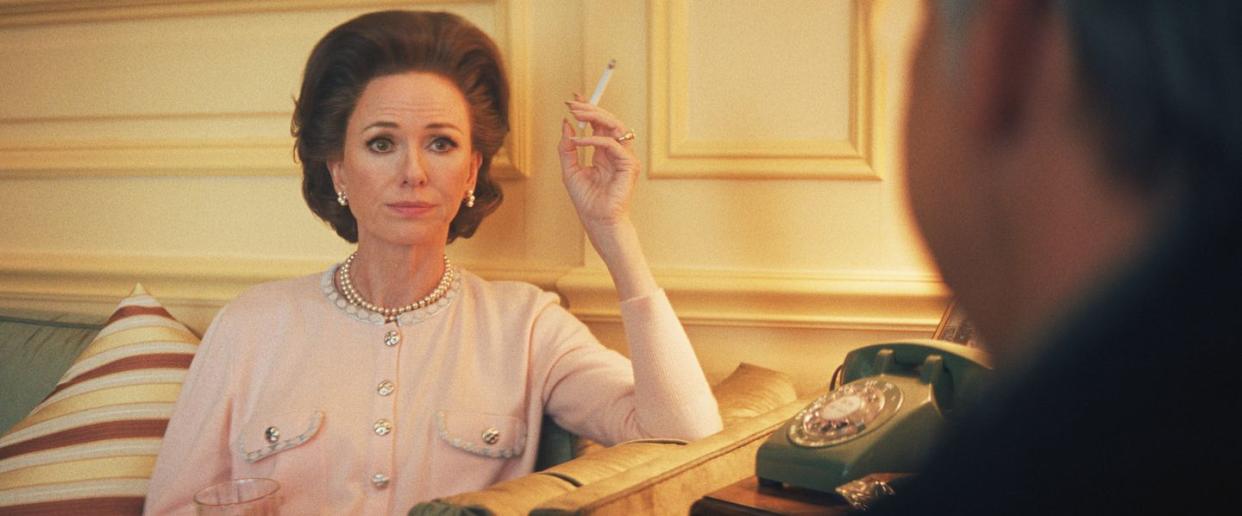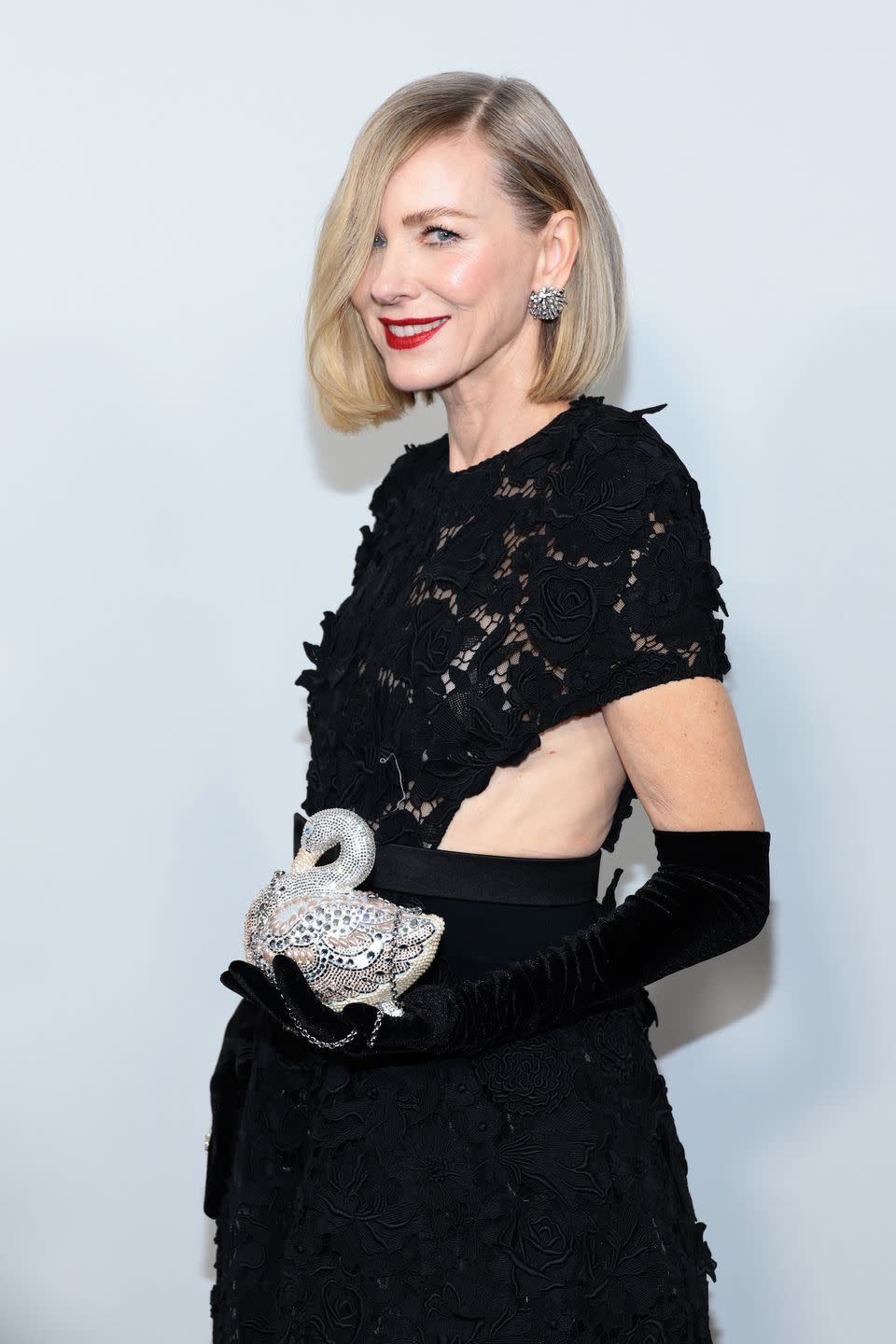Naomi Watts on Becoming Babe Paley

"Hearst Magazines and Yahoo may earn commission or revenue on some items through these links."
Naomi Watts has long been interested in playing ordinary women who find themselves in extraordinary circumstances. Since rising to fame in 2001 as a fresh-faced ingenue in David Lynch’s psychosexual, neo-noir thriller Mulholland Drive, Watts has developed a reputation for being one of the most versatile and adaptable actresses of her generation, earning Academy Award nominations for her work in Alejandro González Iñárritu’s 21 Grams and J.A. Bayona’s The Impossible.
But in recent years, the British-Australian actress has ventured further into television, intent on exploring the inner lives of her characters in a more serialized format. She reunited with Lynch in his 2017 limited-series reboot of Twin Peaks, costarred that year with future husband Billy Crudup in Gypsy, and played the lead role in Ryan Murphy and Ian Brennan’s eerie 2022 suburban thriller The Watcher. A little over a year later, Watts has reteamed with Murphy for Capote vs. the Swans, the second installment of the heavyweight Hollywood producer’s buzzy Feud anthology series, which premiered last week on FX and is now streaming on Hulu.
Written by Jon Robin Baitz and based on Laurence Leamer’s best-selling 2021 book Capote’s Women, the eight-part limited series chronicles the downfall of acclaimed writer Truman Capote (played by an excellent Tom Hollander). Having risen to fame in the 1960s for writing the literary classics Breakfast at Tiffany’s and In Cold Blood, Capote managed to surround himself with a coterie of rich, glamorous New York socialites whom he nicknamed his “Swans.” He ingratiated himself into the lives of these doyennes and became one of their closest confidantes—only to expose their most intimate secrets in “La Côte Basque, 1965,” an excerpt published in Esquire from his planned-but-unfinished magnum opus, Answered Prayers. It was a decision that would cost him nearly everything he held dear.
“It was such an incredible era—the convergence of true glamour and high society,” Watts tells Harper’s Bazaar on a video call from her home in New York City. “[The Swans] were the envy of so many at that time for their grace, for their elegance and opulence, and all of those things that they shared so easily. They were out about town wearing the most gorgeous outfits and dining at the best restaurants. It was considered not tasteful at all to draw too much attention, but they did anyway.”
Watts plays Barbara “Babe” Paley, prima donna of the Swans and wife of CBS chief executive William S. Paley. The other women in Capote’s orbit are played by a who’s who of actors who rose to prominence in the ’90s and early ’00s: Diane Lane stars as Slim Keith; Chloë Sevigny as C.Z. Guest; Calista Flockhart as Lee Radziwill, sister of former first lady Jacqueline Kennedy Onassis; Demi Moore as Ann Woodward, who was suspected of fatally shooting her husband; and Molly Ringwald as Joanne Carson, ex-wife of late-night TV host Johnny Carson.
“Because she’s number one on the call sheet, Naomi was setting a lot of tone along with Tom about seriousness, about investment, about working hard,” Baitz tells Bazaar. “It wasn’t the most fun set, but it was the most rigorous and deeply committed-to-the-concentration-of-character set that I’ve ever been on, and a lot of that came from the delicacy with which Naomi approached building a character. I could see Naomi working empathetically from the clues telling her what to build. She’s the kind of actress that uses the intelligence they’re given and the facts that they have. There’s a real vulnerability and attentiveness in her that comes out on camera, and all of that sensitivity is part of an arsenal; she has special access to her own arsenal of feelings.”
Here, Watts discusses the challenge of building her interpretation of Babe Paley, the experience of working with the rest of the Swans and the late Treat Williams (who played Bill Paley before passing away in June 2023), and the ongoing evolution of her career as an actor and producer.
You’ve mentioned using Laurence Leamer’s book as a way into understanding this bygone era of New York City. How much were you able to glean from real-life accounts of Babe Paley, and how did you prepare to embody her vocality and physicality?
Remarkably, for someone who’s as iconic and known as she was, there was nothing available that was an audio recording or a visual recording. So, [I had] a multitude of fantastic pictures, but I didn’t know about how her voice sounded. I didn’t know the cadence. And in terms of her physicality, I had to really make that up based on the women around her and women of that time. I am a blonde-haired person with really quite different features. I have blue eyes; she had brown eyes. I had to wear false teeth, and that was something I was very nervous about, because that can interfere with your speech, so that took a lot of practice.
But what I did know and what I could piece together from the source material and everything else available on the internet is … There was never a wrong word. There was never an outrageous piece of behavior. There was never a hair out of place or a mismatched outfit. There was always precision, so it’s quite a lot to live up to. It was quite daunting as an actor, stepping into those shoes of having to operate at such a high bar of perfection.

Over the course of these eight episodes, we start to see the cracks in Babe’s facade, especially when she realizes that her health is declining and her husband has cheated on her again. But even as she approaches her impending death, she still feels a need to keep up appearances. [Editor’s note: Paley died of lung cancer in 1978, at the age of 63.]
It’s only interesting if you can find the cracks, because we all know nothing’s ever as good as it seems. Truman’s words were: “She was perfect. Otherwise, she was perfect.” Those are the flaws right there, in that very sentence. No one is perfect without a huge amount of pain on the other side. This is kind of what the connection with Truman is about; they came together and bonded through their pain, and they saw a side of themselves in each other, even though they’re very vastly different people. There were some similarities that just manifested differently.
Behind perfection is a very strong amount of pain, I would imagine. For instance, in the book, it talks about how she would wear these false teeth even in bed, and it was excruciatingly painful to wear them for hours on end, and she wouldn’t dare let her husband see her without them. And most of the time, she would have a full face of makeup as well, so as not to be seen [for who she really was]. Everything she did, everything she said, was in service of her husband and how it was perceived, so that takes a lot of work, a lot of sacrifice.
You worked closely with Treat Williams to build the relationship between Babe and Bill Paley, who seemed to still love each other in spite of all that had happened between them. What are some of your fondest memories from working with him in his final TV role?
Dear Treat was just a complete joy to work with. The humanity in Babe was where you saw her getting closer to the end of her life, living with these deep regrets and wanting to actually feel some level of intimacy. [Given that] she had lost Truman through the betrayal, it was important for her to bond with her husband, or at least try—but it was still so fraught. Treat and I would look at each other on the day and just be holding these pages going, “God, this writing! Look at our luck! This is high-level writing and storytelling.” We just felt so lucky and grateful to be there. It’s not often that you get to this point in your life, your career, where the good stuff comes like this. So it was both gratitude and [a feeling of], “Oh, this feels good. I’m going to pat myself on the back for this.” Sharing little moments like that on the set with Treat—I’ll never forget it.
In addition to playing the lead, you’re also an executive producer on this season of Feud. Your first producing credit came about two decades ago, and I found it very interesting that you were ahead of the curve when it comes to this growing wave of women who now want more creative control by executive producing and starring in their own projects. Do you remember the first time you had that desire to produce? Is that a condition of the kind of projects you want to take on these days?
It’s certainly not a condition. It’s always an invitation or not, but I think the first thing I [produced] was We Don’t Live Here Anymore [from 2004]. I do remember being approached by a studio to have a first-look deal actually even earlier than that. I think I’d had Mulholland Drive and The Ring, and that was it. At the time, I was considering it, and I had a producer friend who’s very prolific now going, “Come on, let’s do it.” I ended up turning it down, and she thought I was crazy, and certainly a few others thought so too. In retrospect now, maybe it was crazy. Maybe I could have done a lot of interesting projects, but at the time it just felt too daunting. It felt like, “Oh my God, I just want to act. I don’t know if I can take on that level of responsibility.”
I think as you grow, and having had a lot of experiences now, I could imagine doing something like that more easily. But at the time, it just felt too risky. I’ve had great successes, great failures, some middle of the road. I’ve had every type of experience by now, so I’m much more up for new things. Risk is fantastic. Failure is inevitable. Success is hardly ever. I know how to ride the waves better—not feel good about it all the time, but I know that they come and go.

How do you go about choosing projects at this stage of your career compared to earlier in your life?
I have children, and I don’t travel during the school year unless it’s for 10 days or something, but that’s about it. That’s all I can manage. It seems crazy, but as they’ve gotten older, the teen years, that’s when they don’t want you, but they need you. [Laughs.] So that’s the first factor in any decision-making, unless it shoots in the summer and I can bring the gang with [me]. I’ve had to turn down some really great things along the way, because it’s been important to me for them to have the consistency of being in the same school and not losing friendships. [That is] probably because of how I was raised. We were always on the road. I went to nine different schools, and it wasn’t great.
People say, how do you make your choices? Those are the logistics I just told you. But it just has to kind of lift off the page for me. I feel like we are who we are, and I’ve got my story intertwined in nearly every story I tell. I would say the stories that I’ve struggled with are usually getting worked out in some kind of way through my work. I’ve definitely experienced grief at a very young age with the loss of my father, so grief and identity could be a repetitive theme. I think having gone to so many different schools and having to reinvent myself and try and fit into different peer groups and being rejected by others, [I am always asking:] Who am I in this group of people? So I feel like those are common threads in the long list of things I’ve done, and they’re pretty human things, as well, that we can all expect to see on the screen in many different ways.
You’ve mentioned that working with exciting filmmakers is one of the major draws for you at this stage in your career, and you recently finished production on writer-director Audrey Diwan’s remake of the erotic drama Emmanuelle.
I knew about it when I was young. It was definitely a big film at the moment. I love Audrey Diwan, and I saw her film Happening and just thought, Wow, what a brilliant piece of filmmaking and storytelling. I just had a fantastic meeting with her and wanted to be in the room with someone great like her. Noémie [Merlant, who stars as Emmanuelle] is also an extraordinary talent. That’s all I can really say, but you can be sure that she’s turning it [upside down]. It’s very different than the original.
What kinds of stories are you looking to tell about women approaching the second half of their lives?
Obviously, art reflects life, and I am the age I’m at now, and I’ve never been scared of that. I always have been really turned on by the idea of playing strong characters. It’s not like I’m looking to just play beautiful women. It’s nice when you occasionally get to do some of that, but I am more drawn to these complex women who sometimes end up very unhinged, so I haven’t built my career around one thing, I would say.
As I get into the middle and latter part of my life, I’m okay with [aging]. I am just always looking for dynamic people, and I’m grateful that people like Ryan Murphy are interested in telling these stories because, look, we’re half the population, we’re living longer. Why shouldn’t these stories be just as relevant and interesting as [stories about] men of the same age?
This interview has been edited and condensed for length and clarity.
You Might Also Like
